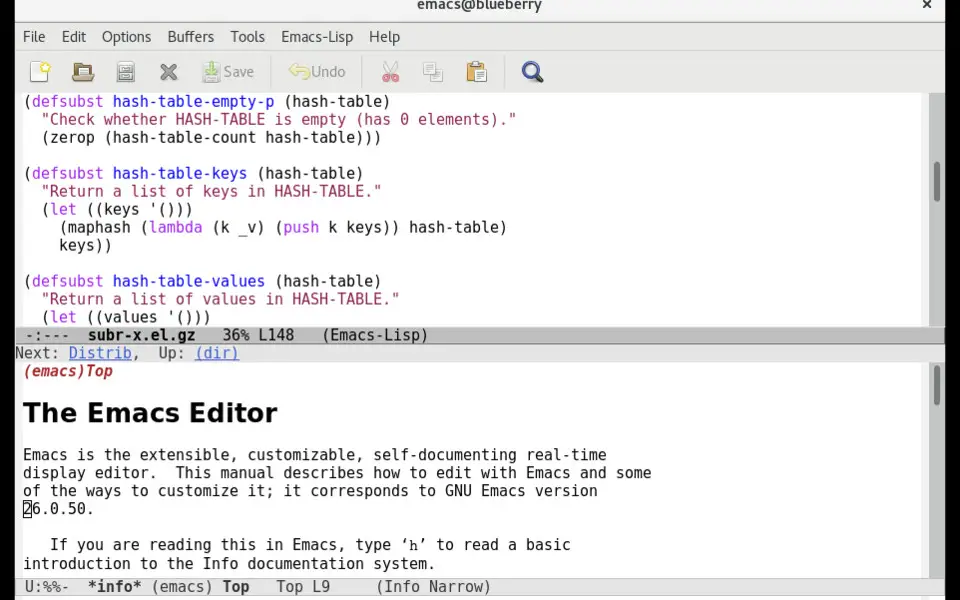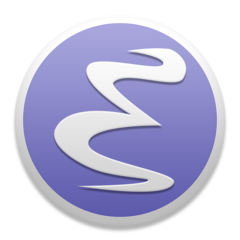|
|
Capitalize word |
||
|
|
Uppercase region |
||
|
|
Lowercase region |
Advertisement
|
The following keys are defined in the minibuffer.
|
|||
|
|
Complete as much as possible |
||
|
|
Complete up to one word |
||
|
|
Complete and execute |
||
|
|
Show possible completions |
||
|
|
Fetch previous minibuffer input |
||
|
|
Fetch later minibuffer input or default |
||
|
|
Regexp search backward through history |
||
|
|
Regexp search forward through history |
||
|
|
Abort command |
||
|
|
Edit and repeat the last command that used the minibuffer |
||
|
|
Activate menu bar items in text terminals |
||
|
|
Select another buffer |
||
|
|
List all buffers |
||
|
|
Kill a buffer |
|
|
Transpose characters |
||
|
|
Transpose words |
||
|
|
Transpose lines |
||
|
|
Transpose sexps |
|
|
Check spelling of current word |
||
|
|
(then ispell-region) Check spelling of all words in region |
||
|
|
(then ispell-buffer) Check spelling of entire buffer |
||
|
|
(then flyspell-mode) Toggle on-the-fly spell checking |
|
|
Find a tag (a definition) |
||
|
|
Find next occurence of a tag |
||
|
|
(then visit-tags-table) Specify new tags file |
||
|
|
(then tags-search) Regexp search on all files in tags table |
||
|
|
(then tags-query-replace) Run query-replace on all the files |
||
|
|
Continue last tags search on query-replace |
|
|
Execute a shell command |
||
|
|
Execute a shell command asynchronously |
||
|
|
Run a shell command on the region |
||
|
|
(then type shell) Start a shell window *shell* |
|
|
Copy rectangle to register |
||
|
|
Kill rectangle |
||
|
|
Yank rectangle |
||
|
|
Open rectangle, shifting text right |
||
|
|
Black out rectangle |
||
|
|
Prefix each line with string |
|
|
Add global abbrev |
||
|
|
Add mode-local abbrev |
||
|
|
Add global expansion for this abbrev |
||
|
|
Add mode-local expansion for this abbrev |
||
|
|
Explicitly expand abbrev |
||
|
|
Expand previous word dynamically |
|
|
Numeric argument |
||
|
|
Negative argument |
||
Advertisement |
|||
|
|
then char: Quoted insert |
||
|
|
Enable or disable input method |
|
|
Enter the Info documentation reader |
||
|
|
Find specified function or variable in Info |
||
|
|
Scroll forward |
||
|
|
Scroll reverse |
||
|
|
Beginning of node |
||
|
|
Go to next node |
||
|
|
Go to previous node |
||
|
|
Move up |
||
|
|
Select menu item by name |
||
|
|
Select menu item by number |
||
|
|
Follow cross reference (return with 1) |
||
|
|
Return to last node you saw |
||
|
|
Return to directory node |
||
|
|
Go to top node of Info file |
||
|
|
Go to any node by name |
||
|
|
Run info tutorial |
||
|
|
Look up a subject in the indices |
||
|
|
Search nodes for regexp |
||
|
|
Quit Info |
|
|
Save region in register |
||
|
|
Insert register contents into buffer |
||
|
|
Save value of point in register |
||
|
|
Jump to point saved in register |
|
|
Start defining a keyboard macro |
||
| Ctrl + X then ) |
End keyboard macro definition |
||
|
|
Eappend to last keyboard macro |
||
|
|
(then name-last-kbd-macro) name last keyboard macro |
||
|
|
(then insert-kbd-macro) Instert Lisp definition in buffer |
|
|
Eval sexp before point |
||
|
|
Eval current defun |
||
|
|
(then eval-region) Eval region |
||
|
|
Read and eval minibuffer |
||
|
|
(then load-library) load a Lisp library from load-path |
|
|
(then customize) Customize variables and faces |
||
|
Source: GNU Emacs refcard
|
|||






What is your favorite GNU Emacs hotkey? Do you have any useful tips for it? Let other users know below.
1108032
498772
411518
366987
307454
277921
19 hours ago
20 hours ago Updated!
2 days ago
3 days ago
3 days ago
4 days ago Updated!
Latest articles